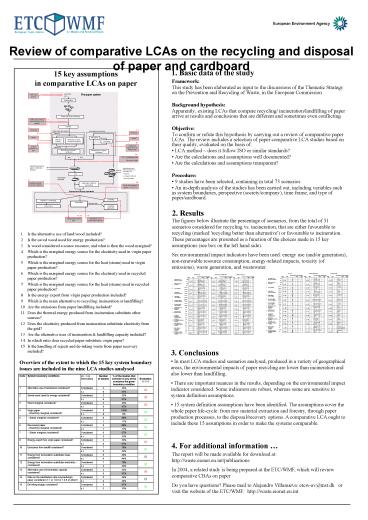1' Basic data of the study - PowerPoint PPT Presentation
1 / 2
Title:
1' Basic data of the study
Description:
Manufacture of paper / cardboard. X % Disposal and recovery operations ... Review of comparative LCAs on the recycling and disposal of paper and cardboard ... – PowerPoint PPT presentation
Number of Views:55
Avg rating:3.0/5.0
Title: 1' Basic data of the study
1
1. Basic data of the study
Review of comparative LCAs on the recycling and
disposal of paper and cardboard
15 key assumptions in comparative LCAs on paper
- Framework
- This study has been elaborated as input to the
discussions of the Thematic Strategy on the
Prevention and Recycling of Waste, in the
European Commission - Background hypothesis
- Apparently, existing LCAs that compare recycling/
incineration/landfilling of paper arrive at
results and conclusions that are different and
sometimes even conflicting - Objective
- To confirm or refute this hypothesis by carrying
out a review of comparative paper LCAs. The
review includes a selection of paper comparative
LCA studies based on their quality, evaluated on
the basis of - LCA method does it follow ISO or similar
standards? - Are the calculations and assumptions well
documented? - Are the calculations and assumptions
transparent? - Procedure
- 9 studies have been selected, containing in
total 73 scenarios - An in-depth analysis of the studies has been
carried out, including variables such as system
boundaries, perspective (society/company), time
frame, and type of paper/cardboard.
2. Results
The figures below illustrate the percentage of
scenarios, from the total of 51 scenarios
considered for recycling vs. incineration, that
are either favourable to recycling (marked
'recycling better than alternative') or
favourable to incineration. These percentages are
presented as a function of the choices made in 15
key assumptions (see box on the left hand
side). Six environmental impact indicators have
been used energy use (and/or generation),
non-renewable resource consumption,
energy-related impacts, toxicity (of emissions),
waste generation, and wastewater.
3. Conclusions
- In most LCA studies and scenarios analysed,
produced in a variety of geographical areas, the
environmental impacts of paper recycling are
lower than incineration and also lower than
landfilling. - There are important nuances in the results,
depending on the environmental impact indicator
considered. Some indicators are robust, whereas
some are sensitive to system definition
assumptions. - 15 system definition assumptions have been
identified. The assumptions cover the whole paper
life-cycle from raw material extraction and
forestry, through paper production processes, to
the disposal/recovery options. A comparative LCA
ought to include these 15 assumptions in order
to make the systems comparable.
Overview of the extent to which the 15 key system
boundary issues are included in the nine LCA
studies analysed
4. For additional information
The report will be made available for download
at http//waste.eionet.eu.int/publications In
2004, a related study is being prepared at the
ETC/WMF, which will review comparative CBAs on
paper Do you have questions? Please mail to
Alejandro Villanueva etcw-av_at_mst.dk or visit
the website of the ETC/WMF http//waste.eionet.e
u.int
2
Overview of the extent to which the 15 key system
boundary issues are included in the nine LCA
studies analysed

